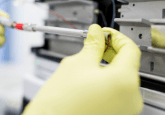New US Pharmacopeia guidelines could transform biologics impurity control

The new guidelines on using mass spectrometry to detect host cell protein impurities in biologics promise to enhance safety, efficacy and regulatory compliance.
In a defining move, the US Pharmacopeia (USP; MD, USA) — a nonprofit scientific organization that sets quality standards for medicines, food and dietary supplements in the US and globally — introduced a new general chapter on 1 December 2024, guiding the use of mass spectrometry (MS) for analyzing host cell protein (HCP) impurities in biologic drugs. This guidance has the potential to significantly enhance drug safety and efficacy, laying the foundation for a new era in biopharmaceutical development.
You may also be interested in:
- A European Bioanalysis Forum recommendation for requiring a context-of-use statement for successful development and validation of biomarker assays
- FDA-approval granted to Accord BioPharma’s IMULDOSA®
- ICH M10 guideline on bioanalytical method validation and study sample analysis
Biologic drugs, including vaccines, gene therapies and antibody treatments, are often compromised by unintended HCP impurities from production processes. These impurities can cause severe and life-threatening side effects, as well as limit drug effectiveness. Existing methods for detecting these protein impurities, such as ELISA, often fail to identify all residual proteins, creating challenges for regulatory approval. This is where MS comes in.
“We’re facing a breakthrough in the pharmaceutical industry. MS is a quick and effective method that can identify 10s of 1000s of different HCPs while detecting their respective amounts, allowing the targeted removal of harmful impurities in drugs. This method is also suitable for complex products such as cell and gene therapies for the treatment of cancers, Alzheimer’s and genetic disorders,” explained Ejvind Mørtz, co-founder of Alphalyse A/S (Odense, Denmark).
MS-based HCP analysis is faster and more precise than ELISA; analyses are completed in just 3 months compared to ELISA’s 24-month timeline. MS-based HCP analysis is already being applied in the development of various biologics, including mRNA vaccines and cell and gene therapies targeting diseases such as Parkinson’s and AIDS. Industry leaders, such as Alphalyse A/S, have been involved in driving this advancement, implementing methods that are now part of the USP guidelines.
The inclusion of MS in the USP encourages a shift toward stricter regulatory standards, potentially transforming and prompting additional quality control across the industry, such as in the US FDA. Experts believe this new guidance will lead to cleaner, safer biologics, enhancing patient outcomes while accelerating the development of innovative therapies.






